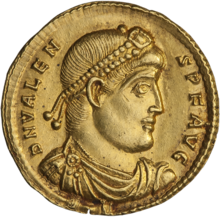This article needs additional citations for verification. (February 2024) |
| Valens | |||||
|---|---|---|---|---|---|
 | |||||
| Roman emperor in the East | |||||
| Reign | 28 March 364 – 9 August 378 | ||||
| Predecessor | Valentinian I (alone) | ||||
| Successor | Theodosius I | ||||
| Co-rulers | Valentinian I (West, 364–75) Gratian (West, 375–78) Valentinian II (West, 375–78) | ||||
| Born | 328 Cibalae, Pannonia Secunda (present-day Vinkovci) | ||||
| Died | 9 August 378 (aged 49)[1] Adrianople, Eastern Roman Empire (now Edirne) | ||||
| Spouse | Domnica[2] | ||||
| Issue | Anastasia[1] Carosa[1] Valentinianus Galates[1] | ||||
| |||||
| Dynasty | Valentinianic | ||||
| Father | Gratianus Funarius | ||||
| Religion | Semi-Arianism[8][9] | ||||
Valens[c] (‹See Tfd›Greek: Ουάλης, translit. Ouálēs; 328 – 9 August 378) was Roman emperor from 364 to 378. Following a largely unremarkable military career, he was named co-emperor by his elder brother Valentinian I, who gave him the eastern half of the Roman Empire to rule. In 378, Valens was defeated and killed at the Battle of Adrianople against the invading Goths, which astonished contemporaries and marked the beginning of barbarian encroachment into Roman territory.
As emperor, Valens continually faced threats both internal and external.[11] He defeated, after some dithering, the usurper Procopius in 366, and campaigned against the Goths across the Danube in 367 and 369. In the following years, Valens focused on the eastern frontier, where he faced the perennial threat of Persia, particularly in Armenia, as well as additional conflicts with the Saracens and Isaurians. Domestically, he inaugurated the Aqueduct of Valens in Constantinople, which was longer than all the aqueducts of Rome. In 376–77, the Gothic War broke out, following a mismanaged attempt to settle the Goths in the Balkans. Valens returned from the east to fight the Goths in person, but lack of coordination with his nephew, the western emperor Gratian (Valentinian I's son), as well as poor battle tactics, led to Valens and much of the eastern Roman army dying in a battle near Adrianople in 378.
A capable administrator[12] who significantly relieved the burden of taxation on the population,[13] Valens is also described as indecisive, impressionable, a mediocre general and overall "utterly undistinguished".[14] His suspicious and fearful disposition resulted in numerous treason trials and executions which heavily stained his reputation. In religious matters, Valens favored a compromise between Nicene Christianity and the various non-trinitarian Christian sects,[9] and interfered little in the affairs of the pagans.[15][13][16]
- ^ a b c d e Jones, Martindale & Morris, p. 931.
- ^ Martindale, John R.; Jones, A. H. M.; Morris, John, eds. (1971). "Domnica". The Prosopography of the Later Roman Empire: Volume I, AD 260–395. Cambridge: Cambridge University Press. p. 265. ISBN 0-521-07233-6.
- ^ Cameron, Alan (1988). "Flavius: a Nicety of Protocol". Latomus. 47 (1): 26–33. JSTOR 41540754. Archived from the original on 7 March 2023. Retrieved 29 April 2022.
- ^ Jones, Martindale & Morris, p. 930.
- ^ Ermatinger, James (2018). The Roman Empire: A Historical Encyclopedia. ABC-Clio. p. 243. ISBN 978-1440838095. Archived from the original on 26 March 2023. Retrieved 18 May 2022.
- ^ "Tables analytiques de la revue des publications épigraphiques". L'Année épigraphique. 1949: 88. 1949. ISSN 0066-2348. JSTOR 25606700. Archived from the original on 28 February 2024. Retrieved 28 February 2024.
- ^ Jones, Martindale & Morris, p. 904.
- ^ "a semi-Arian Homoian" – Lenski 2003, p. 5
- ^ a b Errington (2006). Roman Imperial Policy from Julian to Theodosius (2006), pp. 176, 186–187
- ^ "Numismatica Ars Classica NAC AG, Auction 125". Archived from the original on 12 November 2022. Retrieved 12 November 2022.
- ^ Nicholson, Oliver, ed. (2018). "Valens". The Oxford Dictionary of Late Antiquity. Oxford: Oxford University Press. ISBN 978-0-19-866277-8.
- ^ New Catholic Encyclopedia, "Valens Archived 23 June 2021 at the Wayback Machine"
- ^ a b Oxford Classical Dictionary, 'Valens'
- ^ Jones 1964, p. 139.
- ^ Encyclopædia Britannica,ancient Rome – The reign of Valentinian and Valens Archived 29 June 2024 at the Wayback Machine
- ^ Encyclopædia Britannica, Biography: Valens Archived 10 October 2020 at the Wayback Machine. Accessed 28 February 2024.
Cite error: There are <ref group=lower-alpha> tags or {{efn}} templates on this page, but the references will not show without a {{reflist|group=lower-alpha}} template or {{notelist}} template (see the help page).